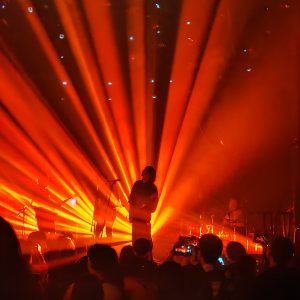The supernova-like lights dimmed on the huge stage at the new iteration of the Dusk Dawn Club (DDC) in favor of a subtler spectacle. During the 700-capacity venue’s long anticipated late-April re-launch, psych-rockers Sincerely Yours, Sergei stepped aside for clarinetist Hadi, his solo a stark – but equally awing – contrast for the packed house. Then Sincerely Yours, Sergei joined the clarinetist in a genre-confounding jam, recapturing the preceding DDC’s intimate artistry, even as the new stage’s lights gleamed loftily.
The zero-COVID lockdown soon halted that ambitious re-opening. A brief lifting of restrictions ended after a few short days, and the future of Beijing’s nightlife remains uncertain, with bars and music venues shuttered once again – for how long is anyone’s guess. All that and more make DDC emblematic of Beijing’s unique live music restrictions and resilience.
Opened in 2014, the first DDC’s distinctively traditional Chinese courtyard ambiance, and grab-bag bills (including jazz, Kazakh folk, and legendary punk artist Mike Watt) made it a favorite of adventurous expats and discerning locals – so much so that Rolling Stone set much of its Beijing music scene profile there.
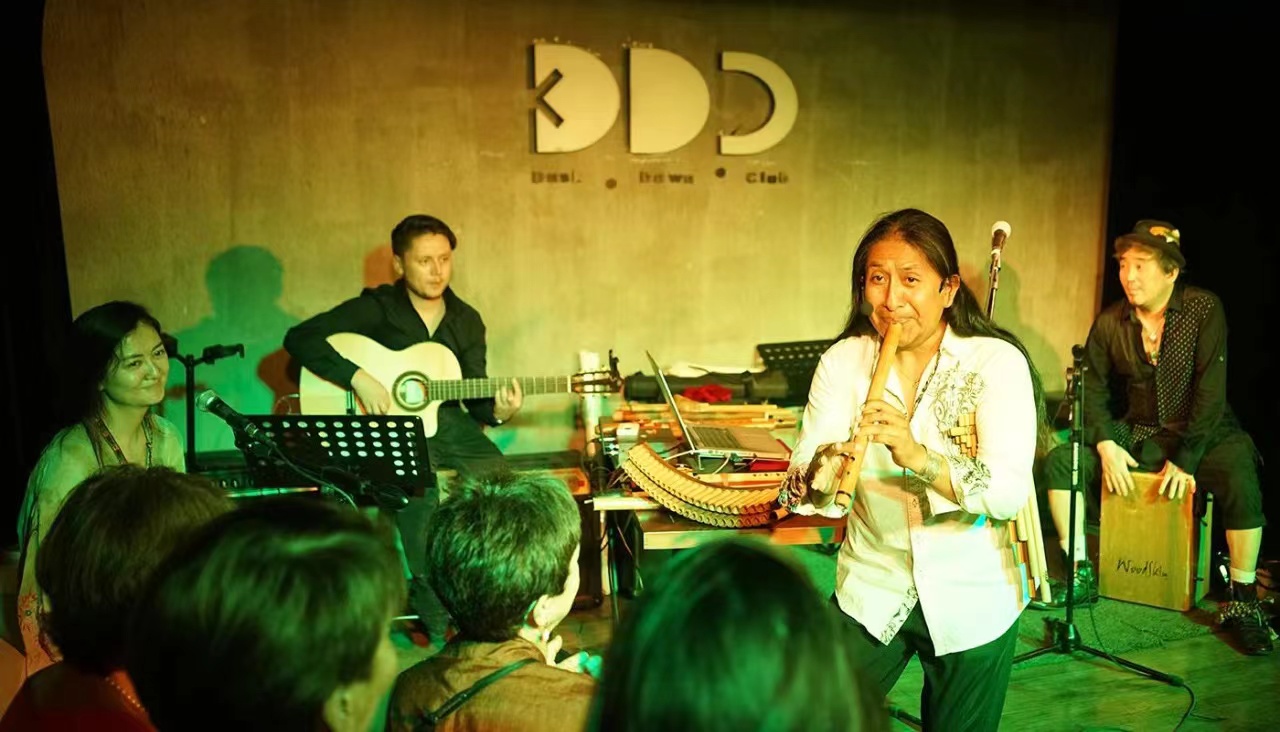
A band performs nose-to-nose with the audience at DDC’s old location. Photo courtesy of DDC.
But operating a rowdy music dive isn’t easy in Beijing’s aged-yet-bohemian courtyards and hutong alleys. Rent hikes and noise complaints from elderly neighbors escalated in the late 2010s. Zoning and permit tightening upended the grey-area status quo. Officials bricked up swaths of business fronts. Meanwhile, China’s censors require musicians to submit lyrics for approval and restrict concerts because of political sensitivities. Yet DDC endured – until 2020’s revenue stifling first-wave lockdown, along with toughened alleyway regulations.
The relocated DDC’s look isn’t a mere departure; it appears built to withstand Beijing’s tumult. Its metallic door and stairs, along with abyss-esque floorspace, evoke a dystopic bomb shelter. The stage-overlooking balcony, on its own, dwarfs its hutong predecessor’s entire mosh pit. No need here to worry about noise complaints: as opposed to an airy courtyard, DDC Redux is in a basement mall in Beijing’s once nightlife-deprived Ritan Russian district. Owner Zhang Jincan, whose clout is such that he was recently quoted by the New York Times, tells The Diplomat that moving from the character-rife hutongs was his “most difficult decision.” But Zhang, whose nickname is “69,” says he can now adopt “a ‘cave’ concept, with intimacy and human touches in this unconventional space.”
Sincerely Yours, Sergei frontman Shaofei says the new venue was perfect for them to showcase Hadi’s eclectic clarinet contribution, because “we’ve seen 69 welcome bands of all kinds.”
The similar relocation of top nightclub Dada from the hutongs to the Russian district, along with the proximity of the Central Business District and embassies, not to mention a comparative lack of scrutiny, made Ritan promising. And while Beijing’s experience with zero-COVID resembled the first-wave restrictions that snuffed DDC 1.0 out, 69 optimistically held on. In the meantime, he “kept the faith” because “so many young people came who’d been waiting two years for our return. It was like a carnival.”
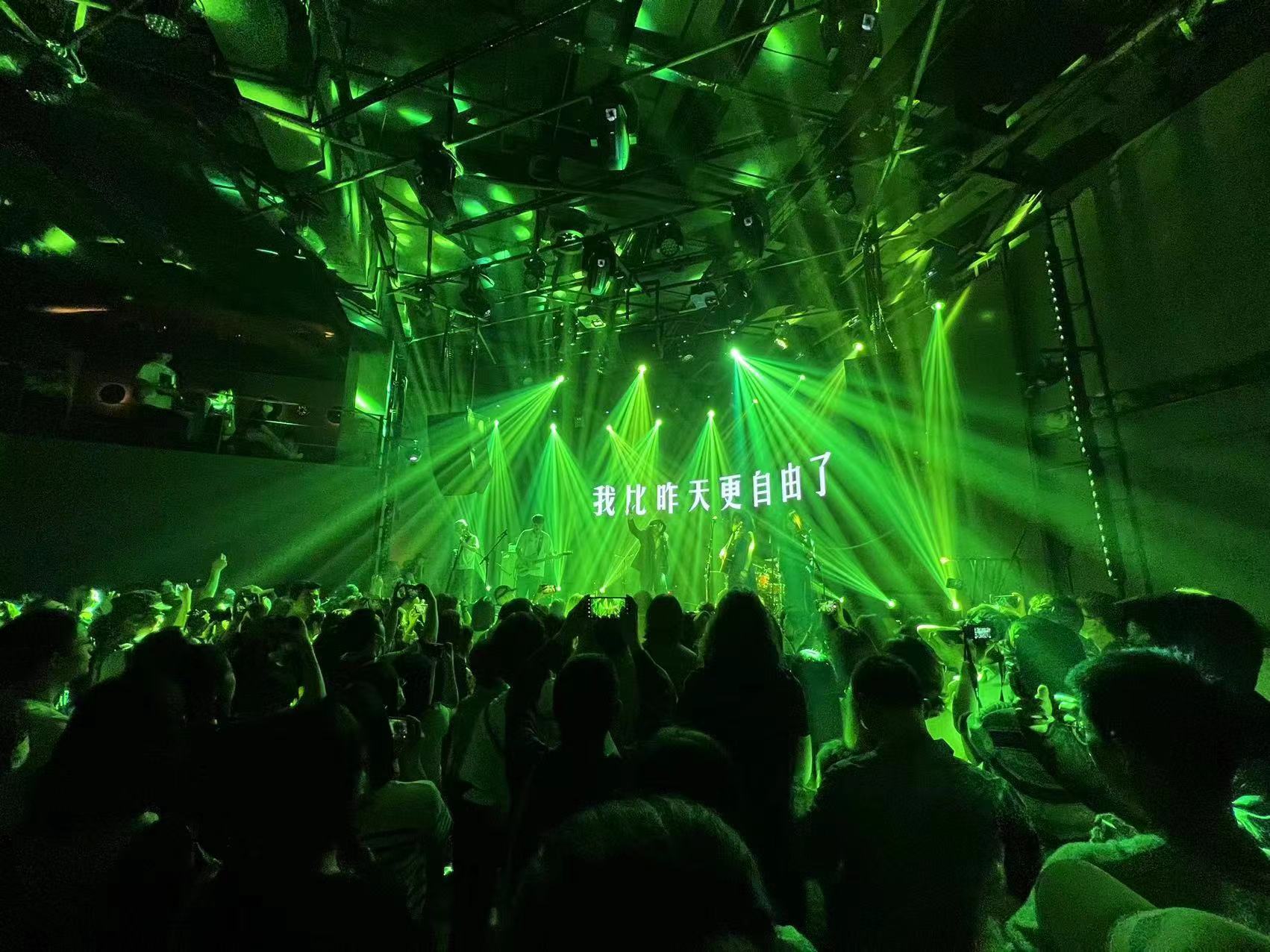
DDC’s new location opened with a spectacular light show. Photo courtesy of DDC.
Those young concert-goers – mostly Chinese – sang along at the re-launch and sipped imported beer and martinis. Such 2022 self-assurance is far removed from the Beijing underground’s fledgling days, when expats dominated shows and Chinese bands imitated international acts. That early 2000s stagnation compelled Michael Pettis – a Peking University school of management professor, who once ran a New York club that put on then-unknown Sonic Youth and Swans – to launch D-22 in Beijing’s Wudaokou university neighborhood in 2006. Post-rockers P.K.14 and punks Joyside honed their chops there until they became Beijing legends. (P.K.14’s D-22 live album is particularly powerful).
The catalyst: P.K.14 opening for what was billed Belgium’s “third best punk band,” “which you can imagine wasn’t very good,” Pettis says, adding that P.K.14 was given short shrift despite stealing the show. So Pettis began platforming Beijing bands, CBGB-style. His club lived up to that tall order both in and beyond Beijing, snagging coverage from NPR, The Guardian, and the BBC. Pettis also co-founded indie label Maybe Mars with P.K.14 frontman Yang Haisong. Signees Carsick Cars gained enough renown to open for Sonic Youth, while The Brian Jonestown Massacre’s Ricky Maymi produced an album by Maybe Mars’ Birdstriking. Birdstriking’s other claim to fame: running afoul of China’s censors.
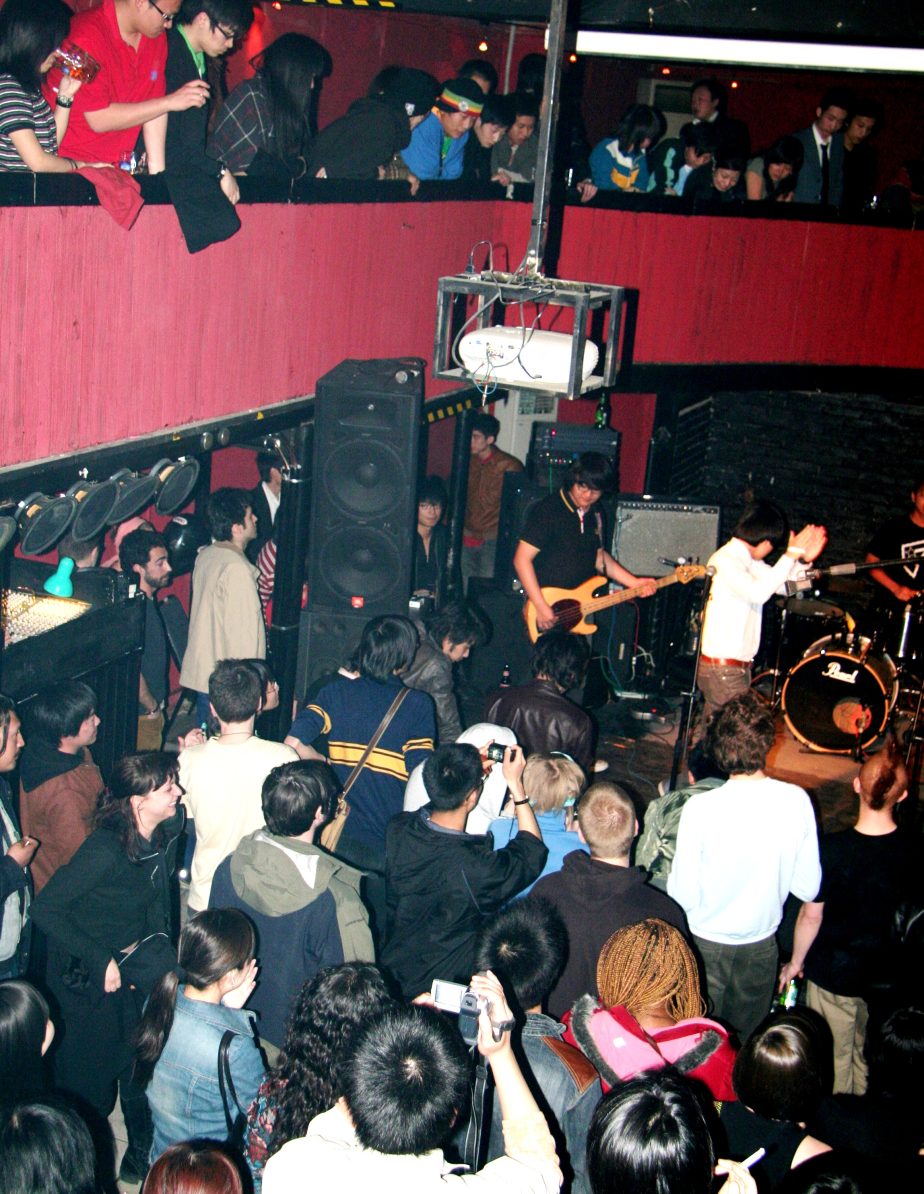
The band Scoff playing at D-22 as the balcony audience looks on. Photo courtesy of Michael Pettis.
Flashy feats aside, the true breakthrough for Pettis came while chatting with a university freshman who enrolled in Beijing to live near D-22. He even carried a mixtape of songs by Carsicks Cars, Sonic Youth, and The Velvet Underground. That “floored” Pettis, who was used to Chinese friends sneering at local music. “But Carsick Cars were the model for this kid,” Pettis says, before revealing that university student was future Birdstriking drummer Wang Xinjiu. That flatters Carsick Cars frontman Zhang Shouwang, who says: “A lot of students liked us because we’re musically untrained,” and therefore relatable.
Wang Xinjiu fondly recalls Pettis being like “Don Vito Corleone” for waiving charges for artists. “The best way to attract musicians is free drinks,” says Pettis, adding: “We got criticized for being insular. For letting the same bands play over and over. But that’s how you break a scene.”
Pettis will never forget Zhang Shouwang nearly fainting during a rapturous “I Wanna Be Your Dog” cover at D-22, leaving the audience agape. But Zhang can’t count the times D-22 “was so crowded, you’d want more oxygen.” Pettis is proud of how “musicians talked about being surrounded by faces in front, on the side and above” at D-22, the latter due to a stage-overlooking balcony, a setup then unlike anything in Beijing.
D-22’s legacy remains formidable, even though early 2022 marked the 10th anniversary of its closure. With DDC’s flashy new debut also this year, the venues bookend a special decade for Beijing’s music scene.
D-22’s end came due in part to looming government restrictions, Pettis said at the time. The Wall Street Journal reported on D-22’s final show, headlined by Mongolian punks Mohanik (who starred in the latest episode of Critical Music Club). Guitarist Davaajargal Tsaschikher says it was one of Mohanik’s first shows outside of Mongolia, and the tour’s most energetic. He shared hot Mongolian vodka with the audience, then drunkenly collapsed onstage and “played very long, psychedelic versions of our songs!”
Audiences flocked to the “last few shows, which were sold out. People were dismayed,” recalls P.K.14. frontman Yang Haisong. But Pettis knew it was time to move on, because D-22 achieved its scene establishing mandate. The venue’s weekly experimental showcase, Zoomin’ Nights, foreshadowed Pettis’ 2012 co-founding of XP. With that hutong venue, Pettis and co. could finally focus on the fringe.
“There was an experimental component to what everyone was doing,” Pettis says of the Maybe Mars bands’ many artsy side projects, which gave their mainstream work innovative flourishes. Audiences’ palates were broadened as a result, says Pettis, and that’s “what made Beijing a uniquely intellectual scene.”
A few years prior, the hutongs’ quintessentially Chinese architecture and popularity with backpackers made them ripe for tourism development, says Nevin Domer, booking manager at D-22 and former COO of Maybe Mars. He says much of the music scene also saw an opportunity, and converged, leading to “bigger venues for bigger audiences. Commercialization came with that, drawing more attention and government regulation.”
Before long, many older disparate venues closed. The hottest shows were happening within a few square kilometers in hutongs at the heart of China’s second biggest city – yet another 2010s Beijing quirk. P.K.14’s Haisong recalls a simultaneous music exodus from Beijing’s west end (which housed university neighborhood dives like D-22, Scream, and 13 Club), as it transformed into the Chinese Silicon Valley.
Amidst that flurry of activity, Pettis and co’s XP reveled in the avant-garde, while Liu Hao, bassist for D-22 mainstay Joyside, co-founded hutong punk dive School Bar with his friend Liu “Felix” Fei. Zhang Shouwang says that “split the scene a bit.” But Liu Hao says it was an organic parting. Felix Liu points out punks like The Diders (“pretty much… School’s house band” according to Pitchfork) often played XP, while Pettis organized experimental sets at School. Liu Felix attributes the camps’ mutual admiration and occasional collaboration to “how, in the D-22 era, punk, indie and experimental musicians all played together and were good friends.”
After XP, DDC, and the raucous Temple Bar; midsized (but fairly commercial) favorites Mao Live and Yugong Yishan; and numerous other hutong venues shut down or moved, School Bar remains a vital 2010s vestige.
Foreigners and trendy locals often romanticize the hutongs’ ambiance, and decry the crackdowns and gentrification that shoved their favorite spots out. Architect and urban planner Zhuang Ziyu understands. Years after graduating from Columbia University, he now works in a Beijing hutong studio. He says the aged alleyway businesses appeal to “people trying to find a special experience that originates from this amazing city.” Yet the hutongs are not only abounding with character, but also infrastructure issues, says Zhuang, hence the regulations.
Those hurdles prompted Zuo Ye to become one of the first 2010s venue owners to eschew the hutongs, and open his mid-size Omni Space in Beijing’s south end. “I love the hutongs and hope there will be more gigs there,” Zuo says. But he notes they’re old residential buildings, needing renovations to reach safety and soundproofing code.
Any Beijinger accused of “hutong hipster-dom” may be surprised to hear 69 agreeing with Zuo and Zhuang. Aside from the infrastructural hurdles, he is also happy to move beyond Beijing’s besieged old alleys to a “more dispersed music landscape” that “balances artistic development.”
Pettis also sees the pendulum swinging. Through much of the aughts the scene wasn’t just scattered, but patchy: D-22 was across town from many venues like the Tiananmen Square-adjacent Old What. “If you tried to visit a few venues in one night, you’d spend hours in a taxi,” he says of Beijing’s then notorious traffic between sprawling nightlife nooks. Beijing’s underground music options grew far more abundant and densely packed in the hutong-oriented 2010s, but the scene is now spreading out again, with more options than the D-22 era (a layout similar to Shanghai and other “bar street”-free major cities).
Pettis says gentrification is driving the current dispersion, adding central areas like post-crackdown hutongs are “closing anything quirky for expensive restaurants and Italian fashion. So if Beijing music revives, it’ll be outside the Second Ring Road,” an expressway encircling the capital’s increasingly commercial core.
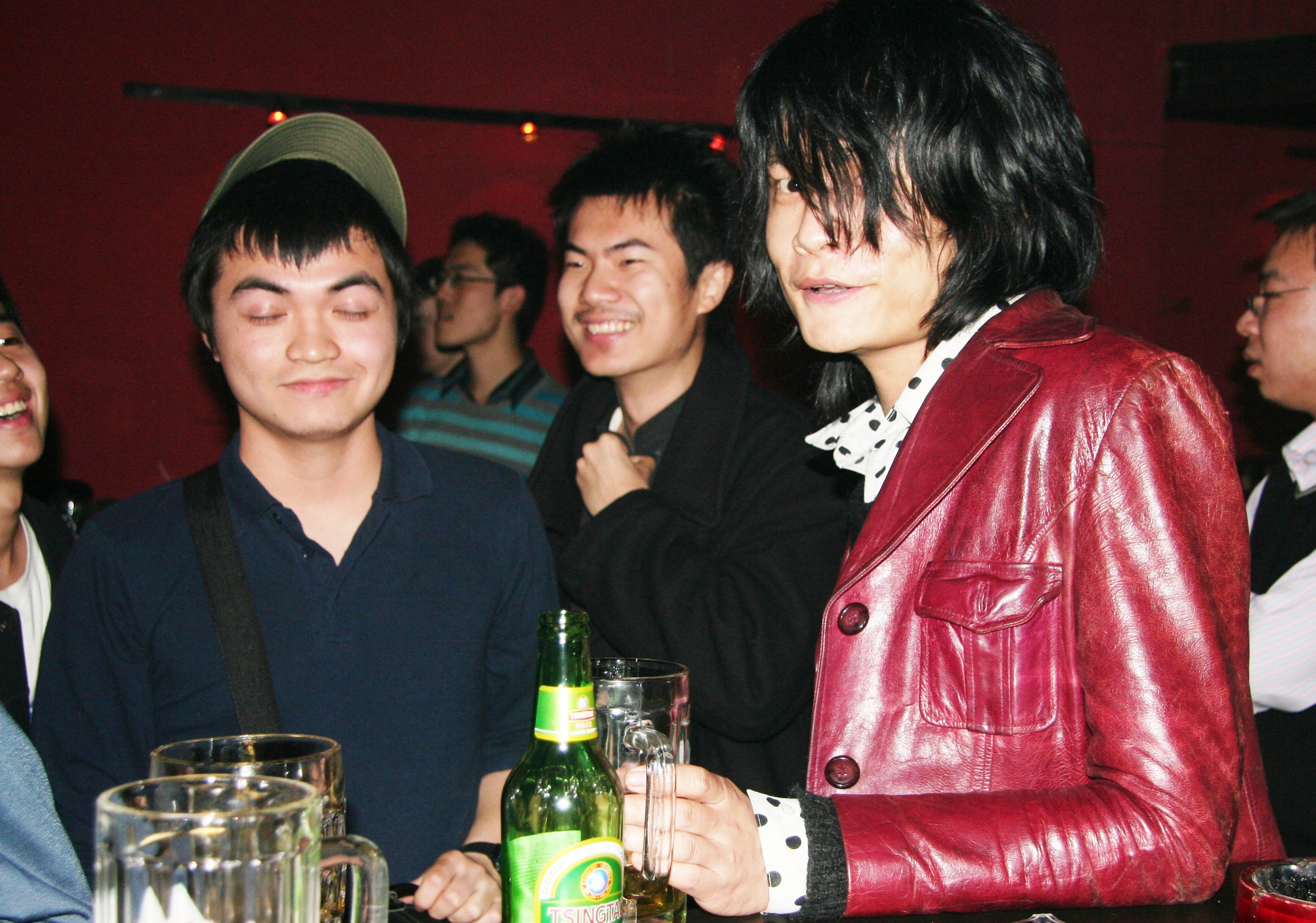
Left to right- Lead singers of Scoff, Carsick Cars (Zhang Shouwang), and Joyside at D-22. Photo courtesy of Michael Pettis.
DDC and Dada indeed reopened just outside the Second Ring Road, though their untested neighborhood likely won’t proliferate like the 2010s hutongs. There are still some thriving hutong venues, especially School Bar. It is often booked six months in advance and actually expanded during the late 2010s crackdown. Part of the expansion involved ensuring its premises were up to code. Of course, situating in the northernmost Wudaoying shopping alley also bodes better for School Bar than other venues in inner residential hutongs.
But a few blocks southwest of School, in the heart of the hutongs, a nook called Nugget flourishes a year and a half after opening. It boasts rolodex-eclectic acts onstage and on its label. However, co-owner David Carey says some neighbors “definitely didn’t want us there,” leading to conflicts. That was mitigated by legions of Nugget-ites that Carey says share “ideals of community, DIY culture, and a love of art and music.”
Equally heartening: Nugget Records’ showcases at bigger venues. Carey makes merch cassette recordings of these and other gigs, doing so with a vast retro hardware spread at recently opened 24D Space this spring. It supports Pettis’ theory about outlying venues, being housed in a Fourth Ring Road bordering industrial park. Spearheading that 24D gig: MusicDish*China, which regularly coordinates up-and-comer-showcases at venues across Beijing. Founder Eric de Fontenay first visited Beijing in 2009 and was so impressed by a D-22 show and other underground stops that he soon returned, and is now a gig pillar.
Nugget, Music*Dish and 24D were live music lifelines throughout the pandemic, putting on many of the hottest post-lockdown concerts, featuring hungry upstarts. Nugget and Music*Dish have both livestreamed many of those young bands’ performances during zero-COVID, the latter dedicating an entire series to pandemic-founded acts called Fresh Out the Pot at another venue called Soi Bar. De Fontenay feels “a certain sense of urgency” to tout that emerging talent not only because of the small venue dearth, but also due to a “wave of new bands since at least 2018 that has not slowed despite the challenges of COVID. It’s actually a tribute to their creative energy and perseverance that they decide to take the leap despite all the challenges.”
24D aims to be equally supportive IRL as zero-COVID finally ends. Co-booker Shao Qiao says Beijing’s big stages have “very hot shows,” but he calls the scarceness of new-band focused venues “not as fun anymore.”
Equally un-fun: the label system. Before co-launching Nugget, Carey had been industry-jaded for years as a guitarist in various signed acts. He says, “There’s a culture here of snapping up tons of young bands and then just sitting on them, hoping they will make it big in a TV show,” a prevailing notion since acts like Carsick Cars competed on the recent series The Big Band, which took indie rock mainstream. Carey wants “to do something different with Nugget Records.”
It won’t just be newbies that benefit from that leg up, say Pettis. “The problem in Beijing is we started at bottom and got really good,” he says. But “the entry level died,” and with it essential competitive lifeblood, says Pettis. Ensuing stagnation was exacerbated by the “disastrous” pandemic, he adds, because even established acts scrapped tours in 2020 and 2022.
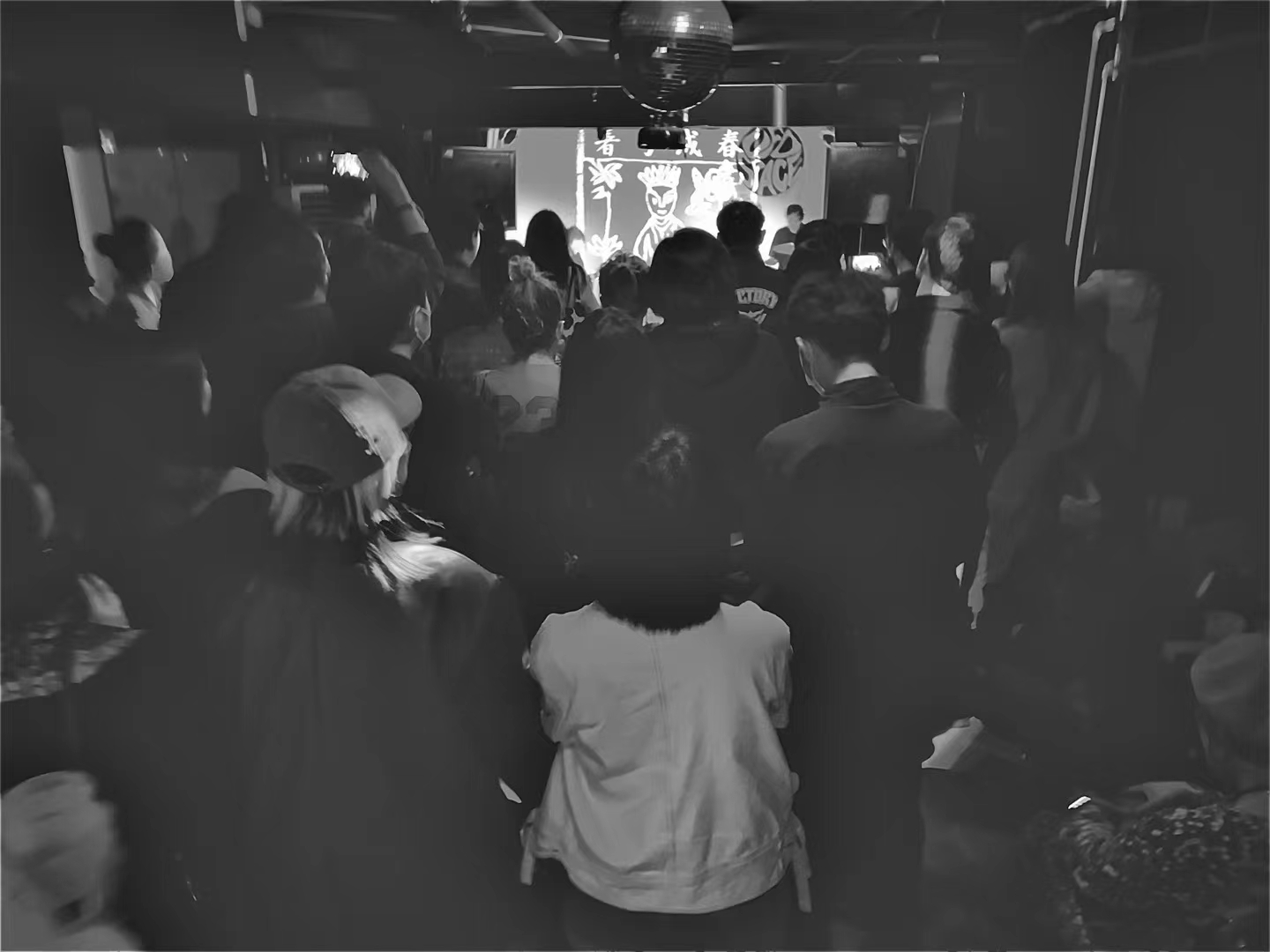
Concert goers at a UFO show. Photo courtesy of UFO.
Zhang Shouwang can’t deny COVID-19 upended musicians’ incomes, but he says such adversity “can inspire art.” He’s equally optimistic about the fledgling east-suburban club UFO, where he played “career-best” avant-garde just before zero-COVID. UFO’s spartan decor and experimental dedication reminded Zhang of New York’s The Stone space. Pettis was equally impressed by both Zhang’s show (the first he has attended in ages) and UFO’s potential to reinvigorate experimentalism in Beijing, along with the older but well-regarded hutong adjacent fRUITYSPACE. Both venues work to end a post-XP experimentalism lull (Pettis couldn’t keep that spot open, due to restrictions yet again, along with a need to “either lose money on the label or the venue”). But UFO and fRUITYSPACE have yet to gain XP’s renown (though its Maybe Mars star power isn’t easy to emulate).
Aside from the avant garde, UFO founder Ryan Lui is passionate about supporting newbies. Yes, entry level venues have frequent “survival crises,” says Lui, but he adds that they’re also nimbly free.
As UFO, 24D, Nugget, Music*Dish, and more address systemic Beijing music issues, Zhang remains hopeful. He also praises School Bar’s weekly amateurs’ night (while 69 says DDC remains committed to novices, which was evident in its re-launch lineup).
Zhang Shouwang knows it’s nevertheless difficult for new Beijing bands to break through. But he encourages them to go DIY and “find a garage to play a show in. Make your own merch. People use their phones all the time – so they will develop a new way to make a scene around themselves,” he says, before insisting: “It’s a new era.”
A previous version of this piece referred to “Sincerely Yours” rather than the full band name, “Sincerely Yours, Sergei.” The Diplomat regrets the error.













